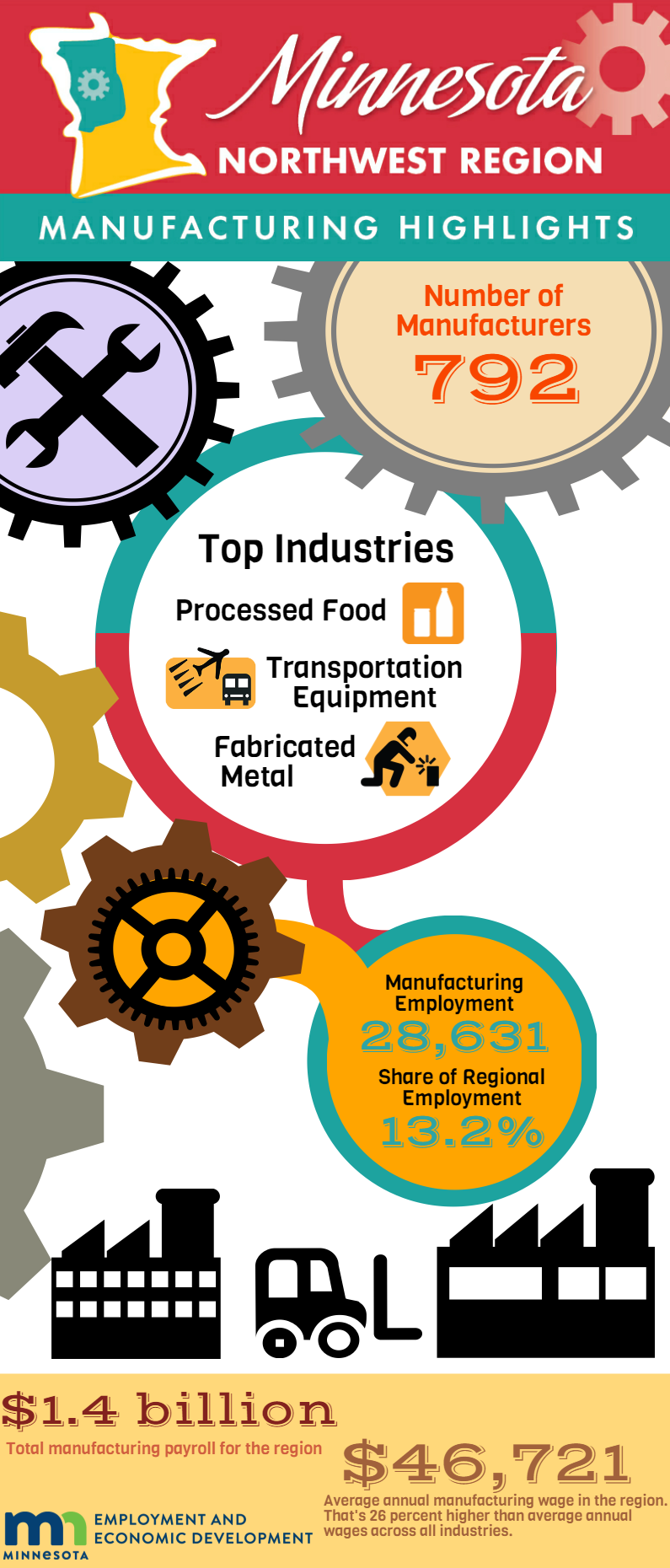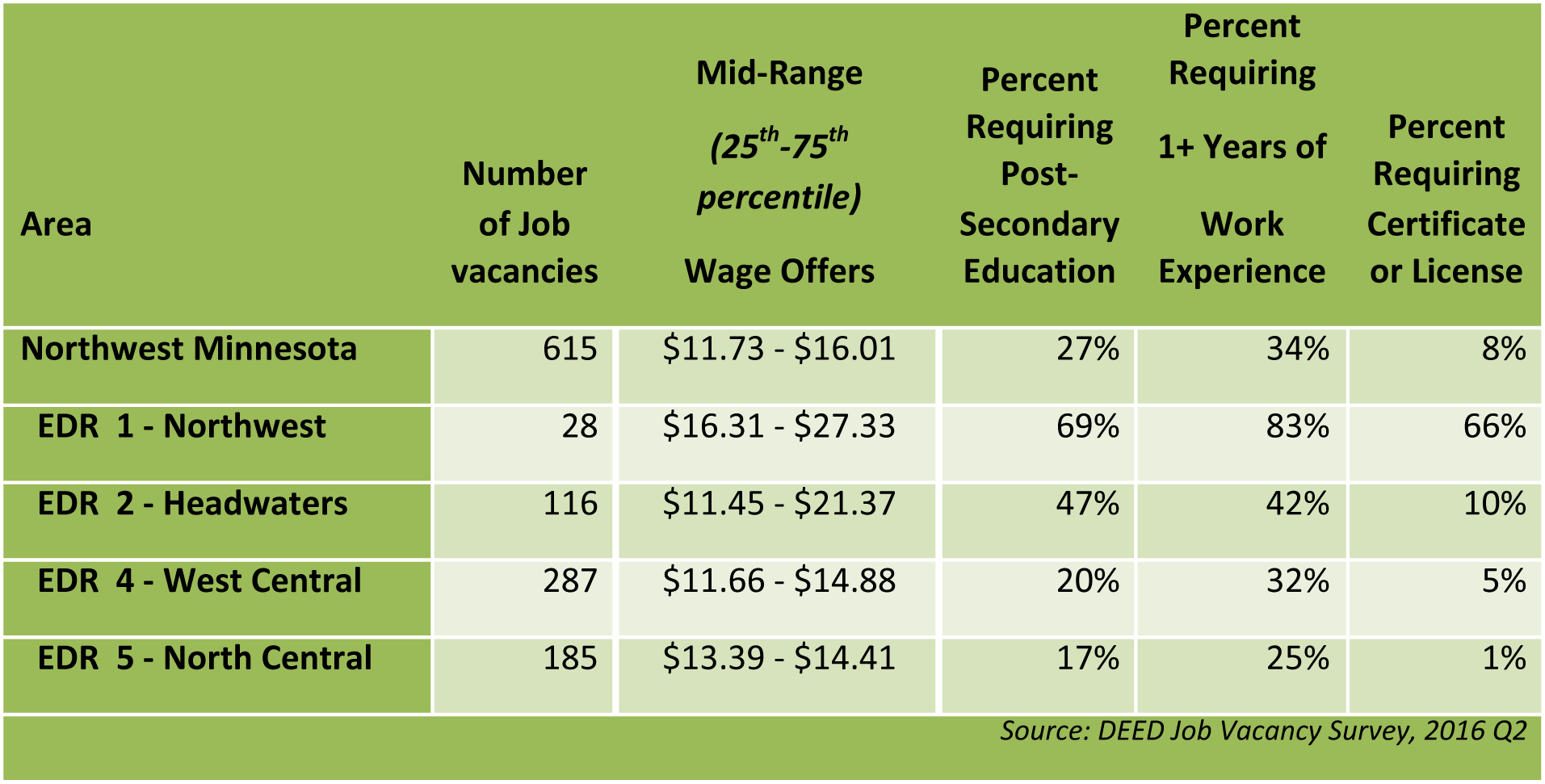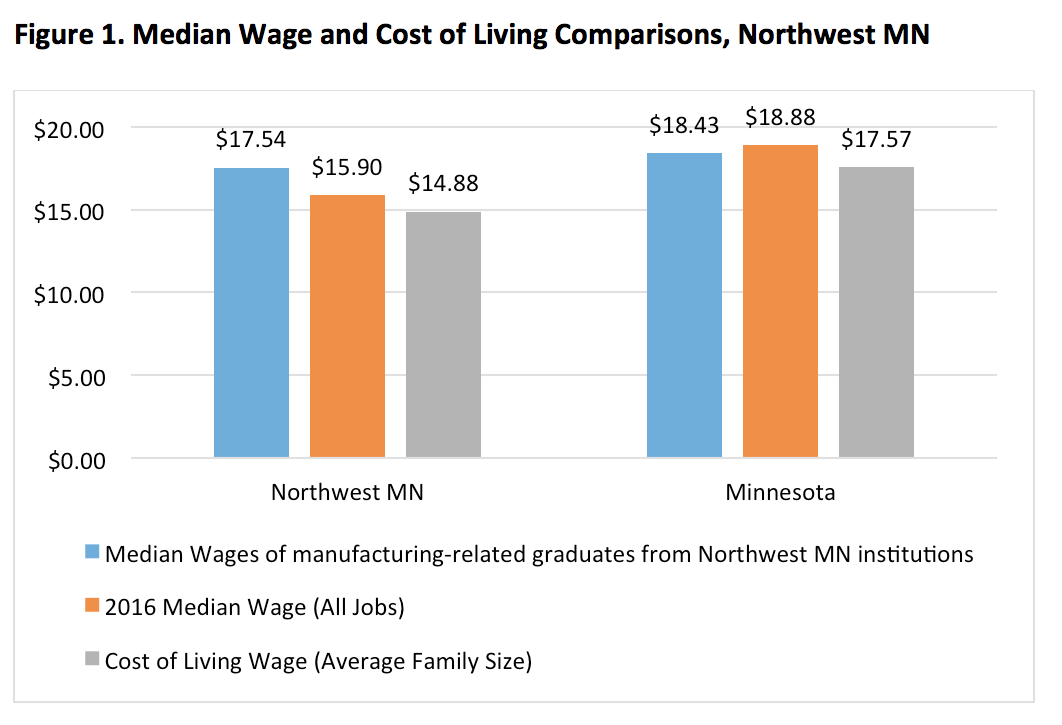10/4/2016 4:10:32 PM
 In Northwest Minnesota, the manufacturing industry provided 28,631 jobs at 792 business establishments, making it the second largest industry in the region in terms of employment, behind only health care and social assistance. Manufacturing accounted for 13.2 percent of total employment in Northwest Minnesota, compared to 11.4 percent manufacturing employment in the state as a whole.
In Northwest Minnesota, the manufacturing industry provided 28,631 jobs at 792 business establishments, making it the second largest industry in the region in terms of employment, behind only health care and social assistance. Manufacturing accounted for 13.2 percent of total employment in Northwest Minnesota, compared to 11.4 percent manufacturing employment in the state as a whole.
From 2010 to 2015, manufacturers in Northwest Minnesota added over 3,200 net new jobs, an increase of 12.7 percent. That made it the largest growing industry in the region, accounting for almost one-third (31.4 percent) of the region’s total job growth from 2010 to 2015. Manufacturing gained almost twice as many jobs as the next-largest growing industry, Wholesale Trade.
With just over 5,700 jobs, food manufacturing is the largest manufacturing sub-sector in Northwest Minnesota, but the region also has significant operations in transportation equipment manufacturing (4,433 jobs), fabricated metal products (4,179 jobs), machinery manufacturing (3,556 jobs) and wood product manufacturing (3,441 jobs). These five sectors accounted for almost 75 percent of the manufacturing jobs in the region.
Manufacturing is one of the highest paying industries in the region. Total payroll in manufacturing was approximately $1.4 billion in 2015, accounting for 17 percent of total wages in Northwest Minnesota. Average annual wages in manufacturing in the region were $46,721 in 2015. That was 26 percent higher than average annual wages across all industries.
However, this was the lowest average annual wage in manufacturing of the six planning areas and over $16,500 less per year than the average annual wage for the manufacturing industry statewide. This is partly due to a slower wage growth in Northwest Minnesota manufacturing since 2013. While average annual wages in manufacturing grew at 6.2 percent statewide since 2013, they grew only 3.3 percent in the Northwest.
The manufacturing industry is always hiring – especially in Northwest Minnesota, where manufacturing ranks second in employment and total wages paid among all industries. Results from DEED’s latest Job Vacancy Survey, which surveys over 10,000 employers statewide, estimates Northwest Minnesota had more than 600 job openings in manufacturing through the second quarter of 2016.
From the 25th to the 75th percentiles, wage offers in manufacturing ranged from $11.73 to $16.01, but varied greatly by economic development region and the percentage of job vacancies requiring postsecondary education and/or work experience.
Manufacturers in “EDR 1 – Northwest” and “EDR 2 – Headwaters” were looking to hire workers with post-secondary education and/or work experience more often, and also had much higher wage offers for new jobs. The mid-range wage offers in those EDRs extended above $20 per hour. This is great news for those looking for a post-secondary program that will help them find a good paying local job after they graduate (see Table 1).

Manufacturers have good reasons to look for employees with post-secondary training, and jobseekers have good reasons to invest in post-secondary training. From 2010-2013, the five Minnesota State (formerly known as MnSCU) colleges offering two-year degrees in Northwest Minnesota graduated almost 950 students in manufacturing-related programs, including engineering technologies and precision production. Almost 60 percent of recent graduates found work in Northwest Minnesota, suggesting that local graduates are willing to stay in the region, and local employers are noticing. The median wage two years after graduating for these workers was $17.54 per hour.
However, there has still been some incentive for local graduates from manufacturing-related programs to look for work outside of Northwest Minnesota. Overall, graduates from these programs (regardless of work location) had a median wage of $18.43 after two years in the workforce, meaning workers who find jobs outside the region are earning higher wages, especially in the Twin Cities metro area.
Despite this pay gap, there are many reasons for regional graduates to stay. Besides the abundance of recreational and outdoor activities, those graduates who decide to stay and work for manufacturers in Northwest Minnesota do much better than average. Their median wage two years after graduating ($17.54/hour) exceeds the regional median hourly wage for all jobs ($15.90/hour) by $1.64, a difference of $3,411 over the course of a full-time work year (see Figure 1 below).

On the flip side, manufacturing-related graduates who leave the region might make more per hour ($18.43/hour), but that does not exceed the statewide median wage for all jobs ($18.88/hour). The data indicates that skilled manufacturing employees are very important to employers in Northwest Minnesota. In fact, manufacturing was the only regional industry in Northwest Minnesota to employ more than 20,000 workers and pay over $45,000 in annual wages per worker, making it a popular and lucrative line of work.
Local graduates who decide to stay and work in Northwest Minnesota also benefit from a significant cost of living difference. The average family with one child and two adults working a combined 60 hours per week would need to make $14.88 an hour in Northwest Minnesota – $2.69 an hour less than the state average – to meet basic cost of living standards. That amounts to over $8,000 a year that a family can save or use for other expenses. See DEED’s Cost-of-Living tool for more information.
Between this cost-of-living benefit, excellent job placement, high regional value and current demand for their skills, graduates of manufacturing-related training programs have ample reason to stay in Northwest Minnesota.
For more information, contact Chet Bodin, 218-825-2183.
manufacturing
Northwest MN